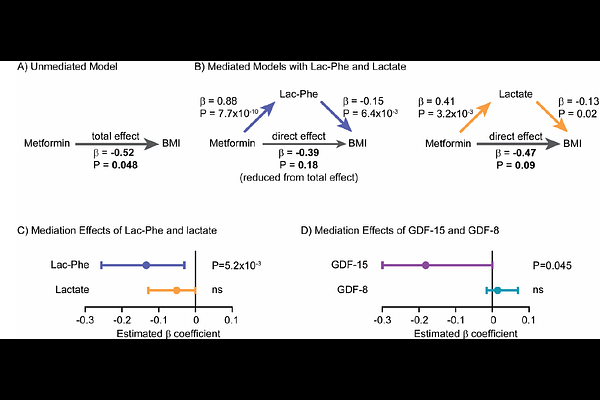Lac-Phe mediates the anti-obesity effect of metformin

Lac-Phe mediates the anti-obesity effect of metformin
Xiao, S.; Li, V. L.; Lyu, X.; Chen, X.; Wei, W.; Abbasi, F.; Knowles, J.; Deng, S.; Tiwari, G.; Shi, X.; Deng, S.; Farrell, L.; Chen, Z.-Z.; Taylor, K.; Guo, X.; Goodarzi, M.; Wood, A.; Chen, Y.-D. I.; Lange, L.; Rich, S. S.; Rotter, J.; Clish, C. B.; Tahir, U.; Gerszten, R. E.; Benson, M.; Long, J. Z.
AbstractMetformin is a widely prescribed anti-diabetic medicine that also reduces body weight. The mechanisms that mediate metformin\'s effects on energy balance remain incompletely defined. Here we show that metformin is a powerful pharmacological inducer of the anorexigenic metabolite Lac-Phe in mice as well as in two independent human cohorts. In cell culture, metformin drives Lac-Phe biosynthesis via inhibition of complex I, increased glycolytic flux, and intracellular lactate mass action. Other biguanides and structurally distinct inhibitors of oxidative phosphorylation also increase Lac-Phe levels in vitro. Genetic ablation of CNDP2, the principal biosynthetic enzyme for Lac-Phe, in mice renders animals resistant to metformin\'s anorexigenic and anti-obesity effects. Mediation analyses also support a role for Lac-Phe in metformin\'s effect on body mass index in humans. These data establish the CNDP2/Lac-Phe pathway as a critical mediator of the effects of metformin on energy balance.